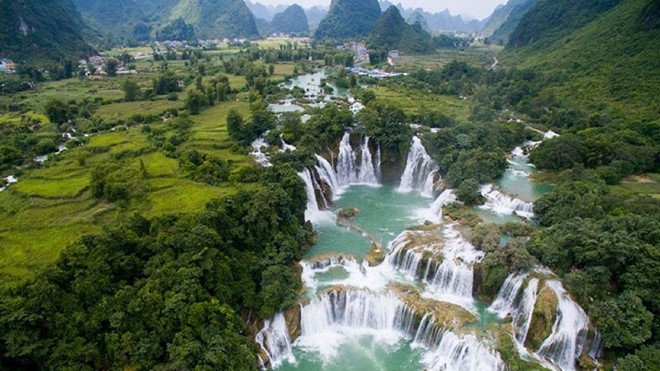


|
A view of Ban Gioc Waterfall, which is part of Non Nuoc Cao Bang Global Geopark (Photo: VNA) Enormous advantages to boost tourism
Cao Bang province is the cradle of Tay, Nung, H’Mong, Dao, San
Chi, Lo Lo and other tribes, each possessing a unique colour of its own
indigenous culture.
The province is the homeland of many popular festivals and
rituals, including the Long Tong festival (Going to the Field), and the cap
sac ritual (a rite of passage declaring the coming-of-age of Dao men
within the community) as well as the charming melodies of folk singing, such
as then, sli and luon singing.
Cao Bang has also been bestowed many fantastic tourist
attractions by Mother Nature, including Ban Gioc waterfall, Phia Oac – Phia
Den National Park, and Non Nuoc Cao Bang Geopark.
Aside from its natural values, the land of Cao Bang also
attracts visitors to explore its tangible and intangible cultural heritages
and historical revolutionary sites.
Prominent among them include the special national relic site of
Pac Bo, where President Ho Chi Minh returned in 1941 to lead the
revolutionary movement after spending over 30 years in other countries to
seek ways for national salvation; and the special national relic site of Tran
Hung Dao Forest, where then General Vo Nguyen Giap established the Vietnam
Propaganda and Liberation Army in 1944, the predecessor of the Vietnam
People’s Army today.
Thanks to the vast advantages, Cao Bang has become an unmissable
place for visitors that are interested in experiencing local culture and
exploring natural and wild scenery.
Efforts to develop authentic tourist products At the end of 2015, the Cao Bang provincial authorities
established the Non Nuoc Cao Bang Geopark, designing it as a model for
sustainable socio-economic development, environmental protection, and
traditional cultural preservation. The move also aimed to effectively bring
into full play the available advantages of culture, eco-tourism and
community-based tourism of the site.
Two years after the establishment of the geopark, which covers
more than 3,000km² in nine districts and hosts over 130 geological, cultural,
historical and natural sites, three tours were set up within the territory of
the park. The first tour explores the Phia Oac mountain peak, the second one
introduces visitors to the historical sites of Cao Bang, and the third one
invites tourists to experience the indigenous culture of the locals.
In April 2018, Non Nuoc Cao Bang Geopark was recognised as a
global geopark by UNESCO, creating considerable momentum for the locality’s
tourism development.
According to Truong The Vinh, Deputy Director of the provincial
Department of Culture, Sports and Tourism, UNESCO’s title has affirmed that
the cultural identity, the land and people of Cao Bang have attracted great
interest from both domestic and foreign visitors.
Cao Bang welcomed around 952,000 tourists and earned
approximately VND189 billion in the tourism sector in 2018. The locality was
visited by more than 8336,000 tourists in the first eight months of this
year, including nearly 71,000 international arrivals, up 98.6% against the
same period last year. Meanwhile, revenue from tourism reached VND219
billion, up 65.65 year on year.
The provincial hospitality sector has set a target of receiving
more than 1 million holiday makers in 2018.
According to Trinh Huu Khanh, Vice Chairman of provincial
People’s Committee, a number of solutions have been taken to realise the
task, while developing tourism in a sustainable way, including developing a
signature tourism brand, enhancing human resources, improving the
infrastructure system, and diversify tourist products to meet the increasing
demand of visitors.
The provincial authorities have implemented favourable policies
in support of businesses operating in hotel and restaurant units, while
stepping up tourism promotion programmes outside the province, mobilising
investment in tourist activities, encouraging local people’s participation in
boosting tourism, and raising public awareness of heritage conservation.
Priorities have also given to safeguarding and upholding the
value of the UNESCO-recognised Non Nuoc Cao Bang geopark, and introducing the
three tours to introduce the park to more visitors.
|